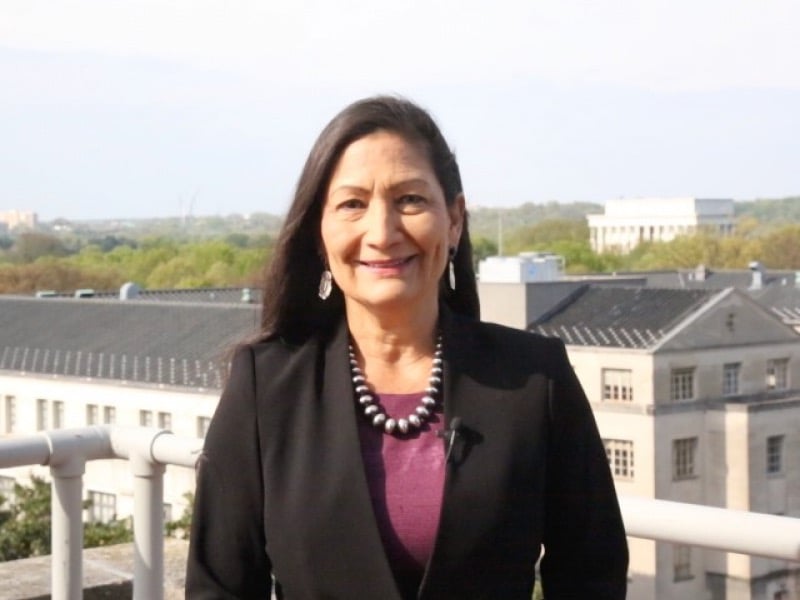Interior Department, Haaland Appeal Ruling Against Seminole-Florida Gaming Compact
Posted on: January 26, 2022, 04:56h.
Last updated on: January 26, 2022, 01:27h.
The US Department of the Interior and Interior Secretary Deb Haaland filed an appeal Tuesday in federal court. They are seeking to overturn a decision made two months ago that voided a gaming compact between the Seminole Tribe of Florida and state officials.

The filing comes six days after the department and Haaland gave notice last week of their plan to appeal. After submitting it in the US Circuit Court of Appeals for the District of Columbia, the court consolidated the case with a previous appeal filed by the Seminole Tribe.
According to an order posted Tuesday by the circuit court, the Interior Department must file its statement of issues by Feb. 9. Additionally, the court has yet to schedule oral arguments in the case.
A spokesperson for the Interior Department declined to comment on the decision to appeal.
About the Case
On Nov. 22, US District Judge Dabney Friedrich tossed out the compact, saying that the deal violated the Indian Gaming Regulatory Act (IGRA). Two Florida-based pari-mutuel operators – the Magic City Casino and the Bonita Springs Poker Room – filed the suit in US District Court in the District of Columbia in August, claiming the sports betting provisions of the compact violated the federal law overseeing tribal gaming.
The compact the Seminole Tribe and the DeSantis Administration reached last spring gave the tribe exclusive rights to operate sports betting statewide, including off tribal lands. Besides mobile sports betting, the compact allowed the Seminole Tribe to also establish a hub-and-spoke network with pari-mutuel operators across the state. The agreement would let cardrooms, racetracks, and other pari-mutuel gaming facilities host kiosks for the Seminole Tribe and receive a share of the proceeds.
The Interior Department had 45 days to review the compact and determine if it complied with federal law. However. federal officials failed to render a decision within that time frame. That meant the compact was considered approved to the extent it complied with IGRA, which states that wagers must be made on tribal lands.
The pari-mutuel operators claimed federal officials should not have allowed the compact because of the off-tribal land provisions. The Interior Department sought to dismiss the case and said Florida and Seminole Tribe officials had the right to determine where gaming occurs
In her ruling, Friedrich determined that the compact violated the “Indian lands” provision of the federal gaming law. While she could have just struck down that provision and kept other portions of the compact, she chose to void the entire arrangement.
Intervention Denial
The Seminole Tribe, which was not an official party in the lawsuit, filed its appeal within two days of Friedrich’s ruling. Despite the pari-mutuel operators filing the lawsuit, the tribe launched its Hard Rock Sportsbook mobile app at the beginning of November.
The app would be suspended a month later after tribal officials were denied a stay on Friedrich’s ruling at the district and circuit court levels.
Tribal leaders sought to intervene in the case at the federal district court level to dismiss the case. In the appeal to federal circuit court judges, they want the panel to determine if Friedrich erred when she failed to give them the opportunity to make their case in her court.
According to the Seminole Tribe’s statement of issues, the tribe says it deserves to weigh in on the case because “the Tribe is a party, no other party to the compact was named, a judgment would substantially affect the Tribe’s vital interests, and the only named defendant could not be expected to adequately represent the tribe’s interests.”
The tribe is not the only entity with a financial stake in the matter. Per the compact, the state of Florida stands to receive $2.5 billion over the first five years of the agreement.
With the new compact currently nullified, the Seminole Tribe continues to operate casino gaming on its lands in Florida through a previously approved compact.
Related News Articles
Most Popular
VEGAS MYTHS BUSTED: Golden Gate is the Oldest Casino in Vegas
Las Vegas Overstated F1 Race’s Vegas Impact — Report
Most Commented
-
End of the Line for Las Vegas Monorail
— April 5, 2024 — 90 Comments -
Mega Millions Reportedly Mulling Substantial Ticket Price Increase
— April 16, 2024 — 6 Comments -
Long Island Casino Opponents Love New York Licensing Delays
— March 27, 2024 — 5 Comments
















No comments yet